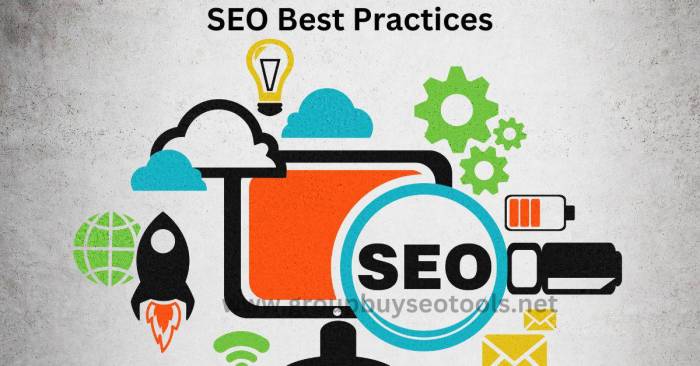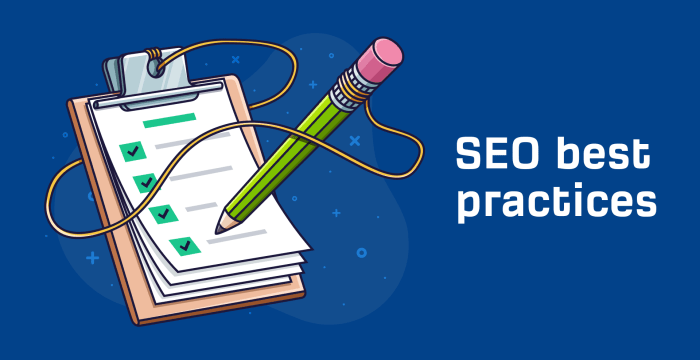SEO Best Practices – Best Practices are like the rules of the digital road, guiding your website to the top of search engine results. From on-page strategies to technical tweaks, this guide dives deep into enhancing your online presence and visibility.
Whether you’re a newbie or a seasoned pro, understanding and implementing these best practices can make all the difference in your online success. So, buckle up and get ready to revamp your game!
Importance of Best Practices

best practices are techniques and strategies used to optimize websites to improve their visibility and ranking on search engine results pages. Following best practices is crucial for website ranking because it helps search engines understand the content of a website and rank it accordingly. Without implementing best practices, websites may struggle to appear in relevant search results and miss out on valuable organic traffic.
Impact of Not Implementing Best Practices
- Low Search Engine Ranking: Websites that do not follow best practices may have difficulty ranking high on search engine results pages, making it harder for users to find them.
- Poor User Experience: Without proper optimization, websites may load slowly, have broken links, or lack relevant content, leading to a poor user experience and high bounce rates.
- Lack of Organic Traffic: By neglecting best practices, websites miss out on the opportunity to attract organic traffic from search engines, limiting their reach and potential for growth.
- Competitive Disadvantage: In today’s digital landscape, where competition is fierce, not implementing best practices can put websites at a significant disadvantage compared to competitors who are optimized for search engines.
On-Page Best Practices: SEO Best Practices
When it comes to optimizing your website for search engines, on-page plays a crucial role in determining your online visibility. By focusing on key on-page elements, you can improve your site’s ranking and attract more organic traffic.
Essential On-Page Elements to Optimize
- Meta Titles: Ensure your meta titles are descriptive, relevant, and include targeted s to improve click-through rates.
- Meta Descriptions: Write compelling meta descriptions that entice users to click on your link in search results.
- Headings: Use proper heading tags (H1, H2, H3, etc.) to structure your content and make it easier for search engines to understand.
- URL Structure: Create -friendly URLs that are concise, descriptive, and include relevant s.
- Image Alt Text: Optimize image alt text with descriptive s to improve accessibility and provide context to search engines.
Importance of Meta Tags and How to Optimize Them Effectively
Meta tags, such as meta titles and meta descriptions, are crucial for on-page as they provide search engines with information about your website’s content. To optimize meta tags effectively:
- Include relevant s that accurately reflect your content.
- Keep meta titles under 60 characters and meta descriptions under 160 characters to ensure they display properly in search results.
- Avoid duplicate meta tags across different pages to prevent confusion for search engines.
Tips on Creating High-Quality Content for On-Page , SEO Best Practices
Creating high-quality content is essential for engaging users and improving your performance. Here are some tips to help you create content that resonates with your audience:
- Research and target relevant s to include in your content.
- Write clear, concise, and informative content that addresses the needs and interests of your target audience.
- Use proper formatting, such as headings, bullet points, and images, to make your content easy to read and visually appealing.
- Regularly update and refresh your content to keep it relevant and valuable to users.
Off-Page Best Practices

When it comes to Off-Page , it’s all about establishing your website’s authority and credibility across the web. This involves tactics and strategies that go beyond just optimizing your own site. Let’s dive into some key practices that can help boost your website’s visibility and ranking in search engine results.
The Significance of Backlinks in Off-Page
Backlinks play a crucial role in off-page as they act as a vote of confidence from other websites. The more high-quality backlinks you have pointing to your site, the more search engines view your site as a valuable and trustworthy source of information.
The Role of Social Media in Off-Page Strategies
Social media platforms are not only great for engaging with your audience but also for building brand awareness and generating backlinks to your website. By sharing your content on social media and interacting with users, you can attract more visitors to your site and improve your overall online presence.
Methods to Increase Domain Authority through Off-Page Techniques
Increasing your domain authority is essential for improving your website’s credibility and ranking in search results. Some effective methods to boost domain authority through off-page include guest blogging on reputable sites, participating in online forums and communities, and getting your content featured on industry-specific websites.
Technical Best Practices
When it comes to Technical , it’s all about optimizing the backend of your website to improve its visibility and performance in search engine results pages. Paying attention to technical aspects is crucial for a successful strategy.
Website Speed Optimization
Website speed optimization is essential for because search engines like Google consider page loading speed as a ranking factor. Slow-loading websites can lead to a poor user experience, high bounce rates, and lower search engine rankings. To improve website speed, you can compress images, leverage browser caching, minimize HTTP requests, and use a content delivery network (CDN).
Structured Data and Schema Markup
Structured data and schema markup play a vital role in technical by providing search engines with additional context about your content. By implementing structured data markup on your website, you can enhance the way your pages appear in search results, potentially increasing click-through rates. Schema markup helps search engines understand the content on your site better, which can lead to rich snippets and featured snippets in search results.





